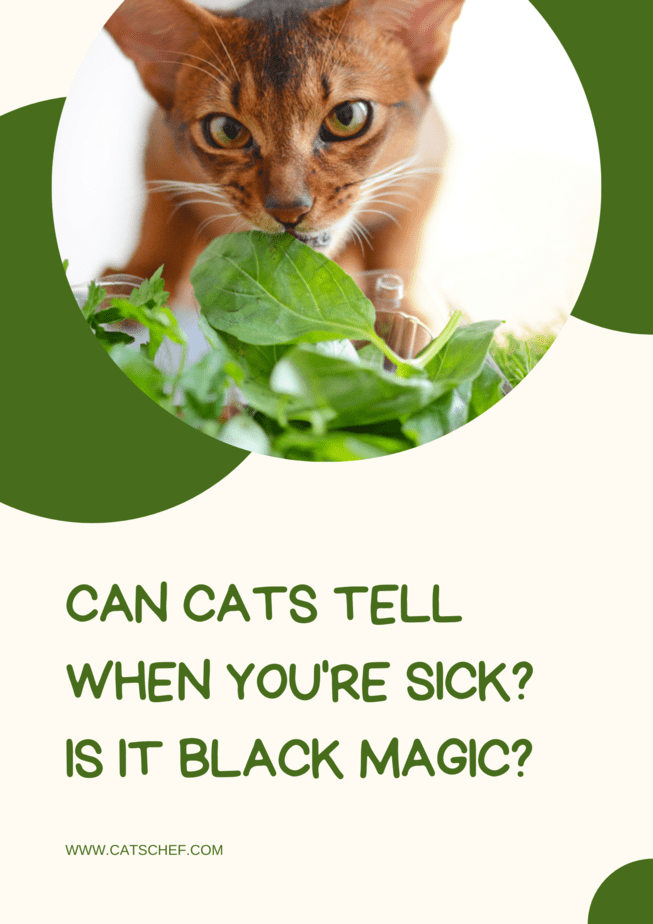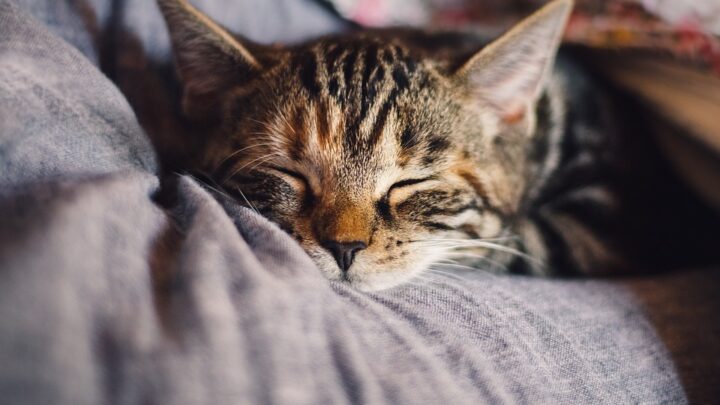Can cats tell when you’re sick or is it just a myth?
Feline owners will probably claim that having a cat in their home is more like being in a relationship than owning a pet.
They exhibit a variety of emotions and moods that account for the variations in these creatures. So it’s reasonable that a cat would get familiar with your routines. Probably yes, is the answer to the issue of whether a cat can tell if you are ill.
A few reports are anecdotal, which isn’t genuine proof in the traditional sense. However, this view is strongly supported by some persuasive studies.
We’ll approach the issue from a variety of angles that will clarify the situation and increase our understanding of our feline companions.
Is your cat, who is usually reserved, suddenly snuggling up to you nonstop? Your cat may sense that you are ill or under the weather and want to be close to you for a variety of reasons.
Cats have a special talent for recognizing when something is wrong, but how? Cats use their sense of smell to identify the disease and can know when you are unwell.
Simply by acting differently around their humans or keeping them awake to take care of themselves, they have saved many people’s lives. Cats are able to detect the signs of diabetes, cancer, heart attacks, and excessive blood pressure.
Due to their keen sense of smell and ability to pick up on hormonal changes, cats are able to detect disease in people.
Cats can also read facial emotions and body language. Your cat will detect any signs of discomfort, such as wincing or a grimace. Cats frequently react to a sick person by being more attached and attentive.
Can cats tell when you’re sick?
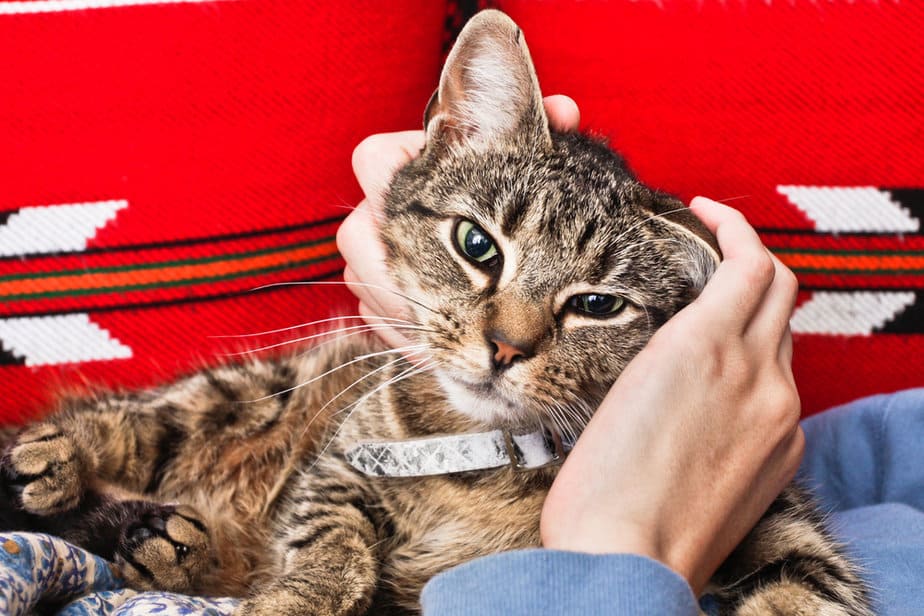
Cats use their sense of smell to navigate rather than their eyesight. They are predators after all. They employ the chemical signals they emit to identify their prey since they have millions of olfactory cells working with them to do so.
It seems natural that cats might detect the many odors you release when you’re ill. To breathe more easily, you could apply some methanol under your nose.
Your cat could be able to detect the varied odors in the throat lozenges you’re popping. According to a 2017 research that was published in the journal Applied Animal Behaviour Science, cats may even be able to detect them more effectively than dogs.
That’s saying a lot when you consider that dogs can recognize some malignancies and low blood sugar. Owners of cats may attest to their animals’ excellent noses for novel odors.
Consider the royal examination you receive when you return home from touching a dog or, gasp, another cat. Hormonal changes cause a person’s (or a cat’s) scent to alter when they are unwell.
A cat will be able to distinguish between the various odors and sense when anything is awry. This is how cats can sense disease in both people and other animals.
Cats brush against one another as a welcome in part to check on one another’s health. This may enable cats in feral colonies to avoid acting as disease vectors.
Cats employ behavioral changes in addition to their smell capabilities to detect illness in humans and other animals. That is especially true for pets with human owners.
Think about how attentively cats watch their owners’ actions. This shows that cats are able to detect disease in people who are close to them regardless of how it manifests.
The trick up their sleeve: the sense of smell
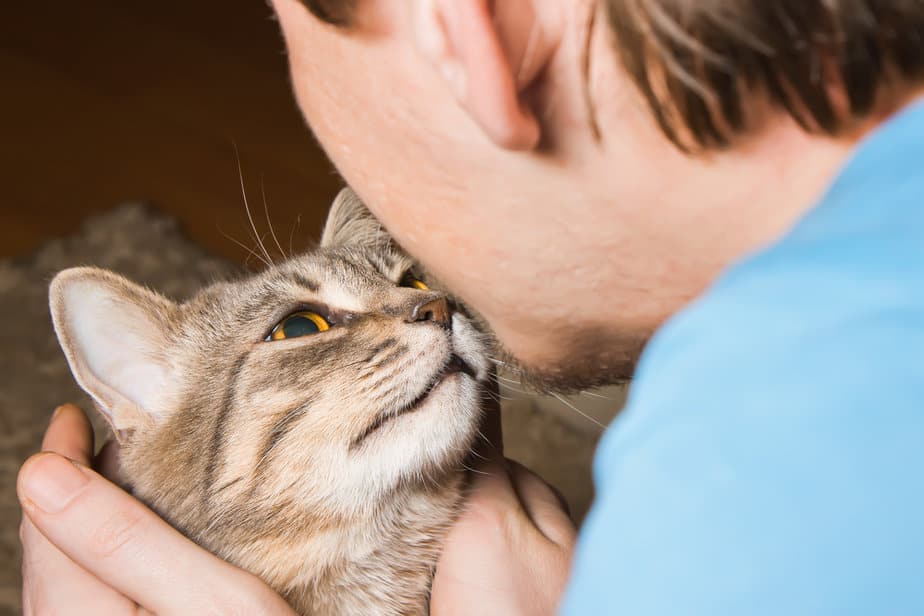
Can cats tell when you’re sick? Their sense of smell is 200 times stronger than people’s. Cats can smell sickness in both humans and other cats.
Your cat will notice if something is wrong or if you have a new ailment that causes your hormones to become out of balance since they are able to pick up the scent of hormonal changes.
Cats have distinct reactions to individuals who are near death because people who are dying have a different chemical odor.
Felines will either steer clear of the human or cuddle up next to them. Even biting or pawing at their person in an attempt to make them feel better is possible.
What diseases can cats detect?
We’ve shown that cats and people have a close bond that could serve as a foundation for disease diagnosis.
The second concern is if there is any evidence to support it. We must travel back to 2007 to a Providence, Rhode Island, nursing facility with Oscar, a therapy cat.
This perceptive cat would leap into beds and cuddle with certain patients, favoring them, the hospital staff discovered.
The remarkable thing was that these people would pass away just hours after Oscar’s visit. 50 impending fatalities were correctly predicted by the cat as of January 2010.
These patients were largely receiving critical care. The timing between the cat’s visits and the results, though, seems strange.
Cats are able to sense the chemical odors that most diseases emit. They can identify the following ailments, albeit they might not be able to distinguish between other diseases or conditions.
Additionally, because the routine is distinct, they are able to detect problems when their humans become worse or experience specific problems.
1. High blood pressure
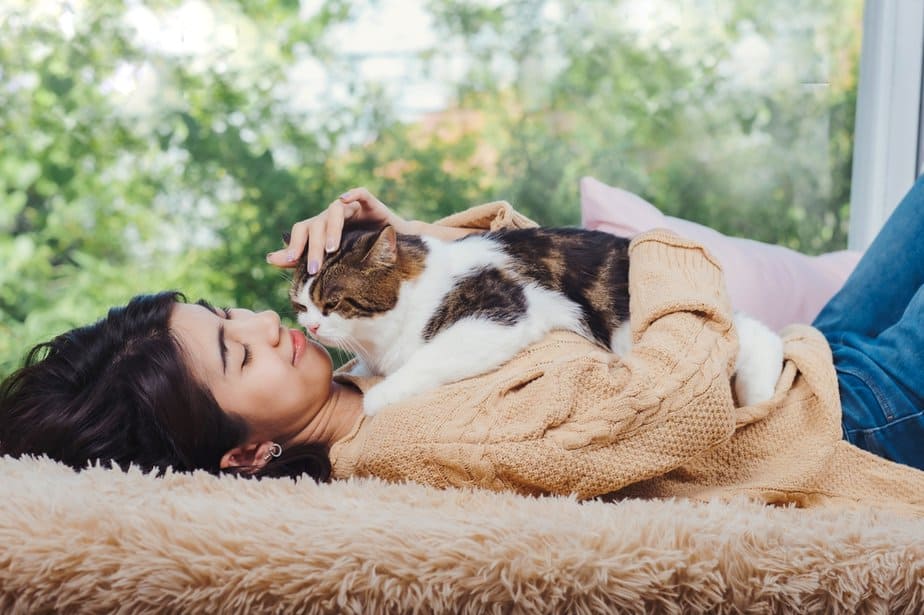
Your cats become accustomed to and start to expect a specific routine from you when your blood pressure is well maintained.
The cat, on the other hand, could come to sit with you more frequently than normal or run away from you if your heart is pounding or your blood pressure is up.
Cats will act differently to let their owners know that anything is wrong since hypertension can occasionally make people feel confused.
Cats may identify a variety of physical and behavioral signs that are often associated with high blood pressure.
Hypertensive patients may exhibit unpredictable behavior and annoyance. It’s not difficult for a cat to miss this, especially if it has a tight bond with the person.
Similar to high blood pressure, a rise in heart rate is frequently brought on by hypertension. Therefore, if you have a tendency to pet your cat, it will become aware of this odd heartbeat while laying on your stomach or chest.
2. Cancer
Cats can sniff an area where cancer is subsequently found and can identify the scent of cancer. This works because cancer releases an off-putting odor and raises the body’s polyamine levels.
Your cat is aware of your scents, so if it starts to smell you oddly, pay attention and schedule an appointment with the doctor.
It’s unclear if cats can use their noses to detect cancer. Anecdotal information, which is not scientific, however, shows that they might be able to.
There are stories of cats smelling cancer on a body area that was later discovered. The Annals of Internal Medicine reported that it may be possible for cats to detect the scent of cancer.
The body produces more polyamines, an organic molecule, as a result of cancer. Cats can more readily identify these chemicals because of their strong scent.
3. Diabetes
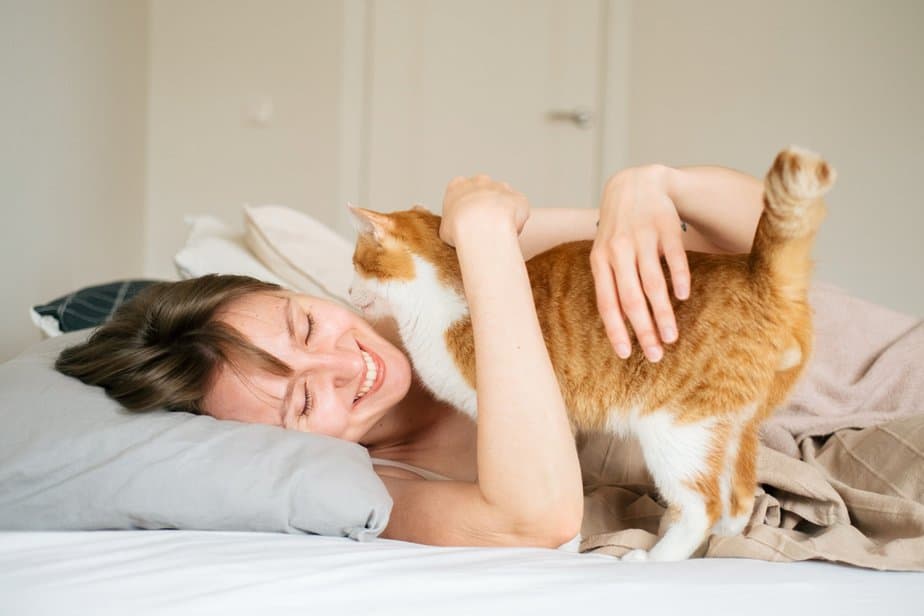
Cats can detect diseases and other ailments like diabetes and cancer because they have almost 200 times more smell receptors than humans do.
Cancer and diabetes both smell similar, and a cat will wake you up if your blood sugar drops so you can take care of the problem.
Diabetes, like cancer, has a distinctive fragrance that is sickeningly sweet because of too much glucose. This is discovered in a person’s perspiration as well as urine.
This smell is unpleasant to cats and may even irritate them. This will be evident in how your cat behaves.
The cat, for instance, could smell you and flinch or run away in disgust. As an alternative, it can begin picking through your clothing in an effort to discover what is causing the unusual odor.
You should observe your cat’s behavior if you think you could have a diabetic risk factor. Schedule a blood test appointment with your doctor if you detect any behavioral changes. The likelihood is that your cat may be detecting early diabetic symptoms.
It’s interesting to think that your cat may pick up on symptoms of low blood sugar just by watching you. Your cat may pick up on signals of sickness if you seem worn out, frail, or shaky.
4. Depression and anxiety
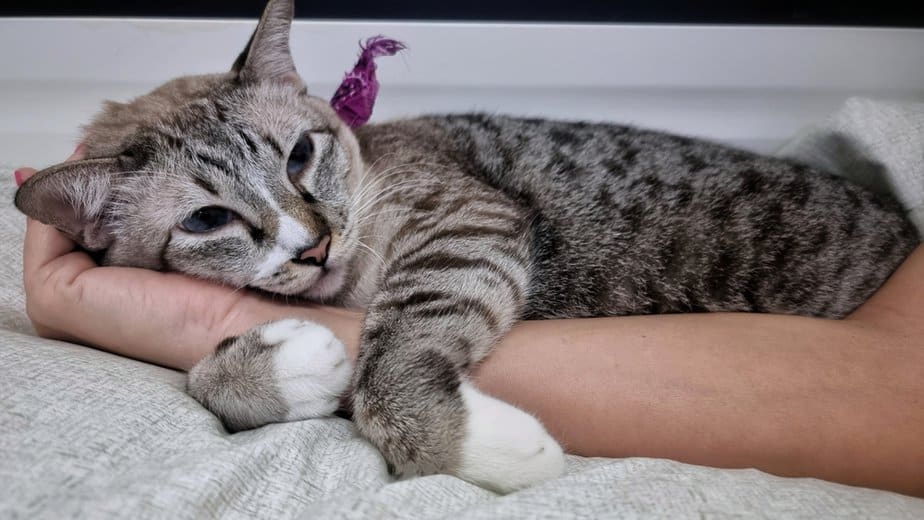
Can cats tell when you’re sick? The answer is yes, and it’s not just physically, but emotionally as well. Dogs are said to be more sensitive to human emotions than cats. The ability to read fundamental emotional clues in body language and facial expressions is unquestionable, though.
In other words, your cat links your grin with happiness and vice versa. It’s likely that your conduct will show when you’re feeling down.
Depression is characterized by its draining effect on a person’s vitality, productivity, and sociable nature. It affects how they connect with others and even with their own pets.
Your interactions with your cat will be affected if you’re experiencing depression. It won’t escape attention. No matter how hard you attempt to hide how you’re feeling, your cat will be able to tell because of your lack of excitement and increasing sluggishness.
Most cats will become more sensitive in response to their owners’ sadness. Sadly, this could make them imitate your actions and become reclusive and melancholy. This is not good for your cat’s health since it might lose its appetite and develop a compromised immune system.
It’s crucial to provide your cat food and stimulation that can make it feel better till you feel better yourself. Ask a family member to look after your cat until you get over your sadness if required.
5. Mental illnesses
Cats are highly skilled olfactory animals. They are able to detect odors produced by alterations in the body’s chemistry.
Hormonal imbalances frequently cause or are caused by mental problems. Your cat probably smells something different from you.
Cats may infer information about your health from changes in your attitude and behavior. As a result, your kitty will notice if you suddenly start acting withdrawn and angry due to a mental condition in your interactions with it.
6. Seizures
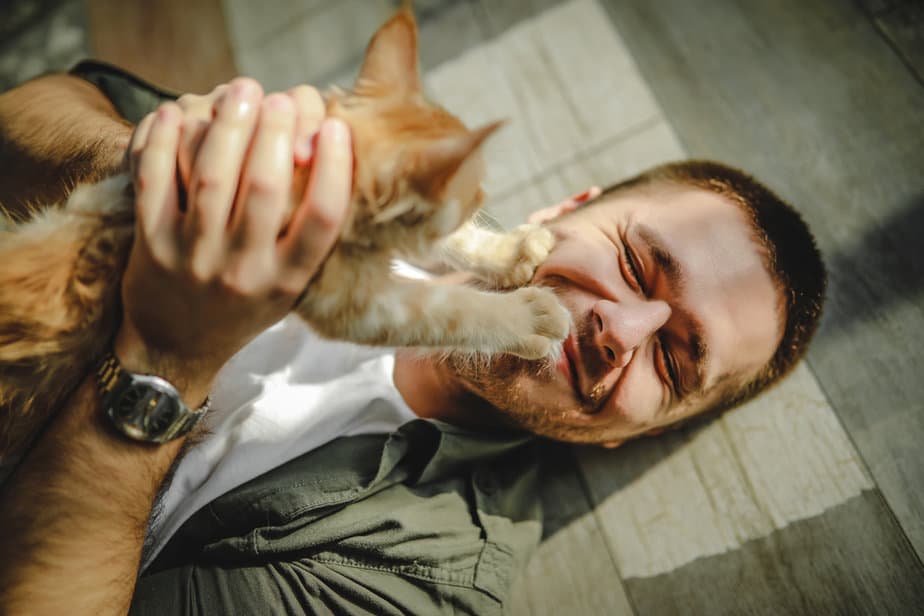
Your cat will pick up on whether you frequently get seizures as a result of epilepsy or whether you’ve never experienced one but are about to.
There are various bodily changes that occur before the onset of a seizure that warns a cat that something is amiss.
Cats catch up on the energy and stay by the person’s side throughout and after the seizure to ensure that everything will be okay.
7. Hypoglycemia
A person who has hypoglycemia has lower-than-normal blood sugar (glucose) levels. Typical symptoms include: sweating, lethargy, higher heart rate, and body trembling.
Cats are quite skilled at detecting such disease indicators by smell and physiological changes. This implies that if you have signs of hypoglycemia, your cat will probably notice that you are sick.
8. Broken bones
Cats can’t see through material items since they lack X-ray vision. But how can cats tell when you’re sick? Well, they’re able to detect fractured bones by studying the physical and behavioral changes in their owners.
For instance, you may be wearing a cast on your arm and display pain-related facial expressions. Your cat could thus be able to tell if you have an arm injury.
Similar to how a cat may infer meaning from the usage of crutches or difficulty moving due to a broken leg. You will be aware that your leg is broken.
9. Cats can tell when you’re in pain
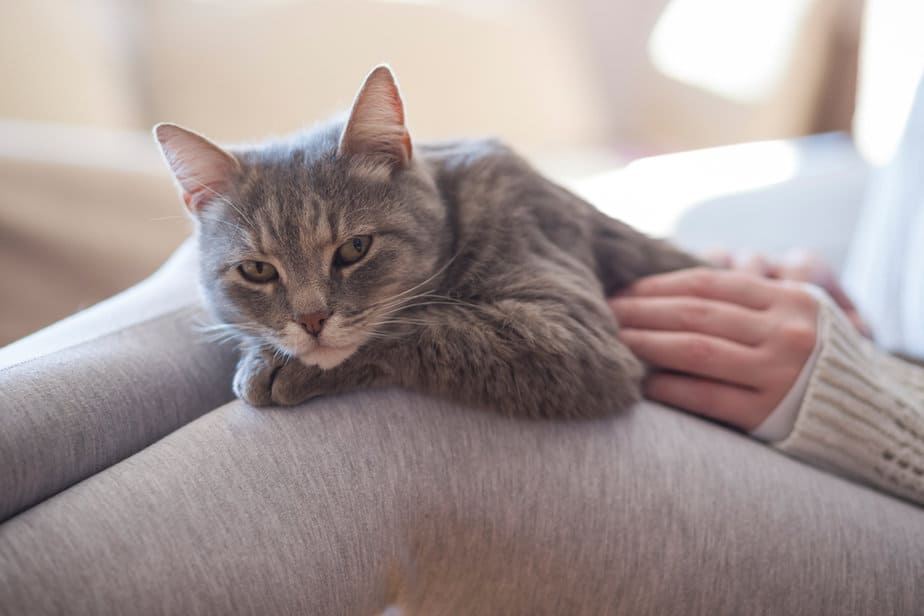
Perhaps more than any other ailment, cats can sense when their humans are in agony. Cats are very perceptive of their owner’s feelings. They pay close attention to both psychological and physical stimuli.
They may tell you are in agony by reading your facial expressions, such as wincing and grimacing.
The body will go through various changes that are visible to a cat when a sick person is getting close to the end of their life.
For instance, a cat’s olfactory receptors will be able to pick up on changes in hormone and chemical levels in the body. Senior living facilities and other surroundings are likely to expose cats to the “scent of death” more frequently.
Even though it sounds morbid, cats do this because they are aware of what will happen next. They are only attempting to console their preferred person.
How do cats act when you’re sick?
How your cat behaves around you or other unwell people depends on its temperament. If you have a cat that is inherently loving, it will snuggle with you and be there for you.
However, if your cat has a tendency to be worried, the smell or energy of a sick human can make it run away. A cat may also become too hostile toward you if it notices something unusual about you. So, cats can definitely tell when you’re sick.
Investigate what could be wrong with you before punishing your cat for this. Or, if your cat flees from you when it usually comes running when you call it, you could be experiencing a problem and should arrange an appointment with a doctor for a checkup.
Cats are sensitive to the suffering of their owners and may show this by becoming attached.
Keep in mind that cats and their humans may develop loving relationships. As a result, a cat will show its owner greater attention when the latter is unwell.
But cats frequently imitate their unwell owners’ behavior and attitude because of their extreme empathy for them. Your cat may begin acting withdrawn and sluggish if you are experiencing these symptoms due to sickness.
Let’s see some proof!
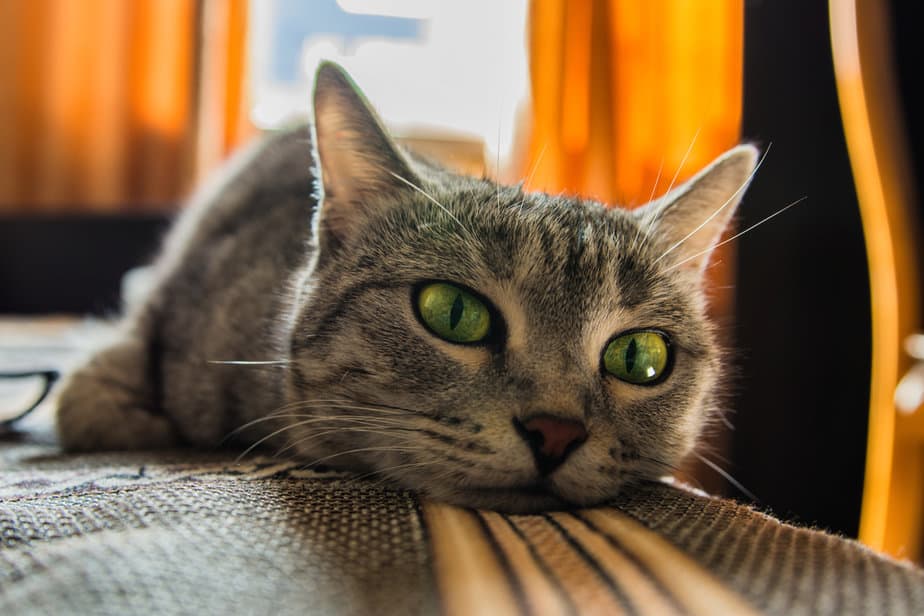
Through their keen sense of smell or when their routine is disturbed, cats can save people’s lives. There are tales of cats that, when they noticed that one of their human partners was ill, roused them up or sat by their side to ensure their survival.
You might be wondering if cats are able to tell when you’re sick. The stories that follow demonstrate how this subject was used in various contexts.
For instance, Monty seldom bites his human, but on this particular day, he kept nipping his human companion’s fingers on her left hand. The thing is that his pet owner had diabetes.
She attempted to tell him to stop, but he persisted, so she stood up but instantly felt lightheaded. Also, the cat checked her blood sugar and discovered that it was dangerously low; a diabetic seizure was likely to occur.
She felt better after taking some sugar pills, but Monty never left her side. He allowed her to return to bed after the second test came out clean.
It makes sense that a cat would be able to detect things that its people wouldn’t because their sense of smell is 200 times more sensitive than a human’s.
There’s another story where Gepetto put his sense of smell to good use. In the words of his human, Phyllis, he woke her up at 6:30 AM with an “awful sequence of yowls.”
She had a bad headache and extreme nausea when she went to bed the previous night. She felt much worse when she heard her cat yowling and contacted her husband, who was already at work. He instructed her to leave the house and dial the gas company and emergency services.
Final thoughts
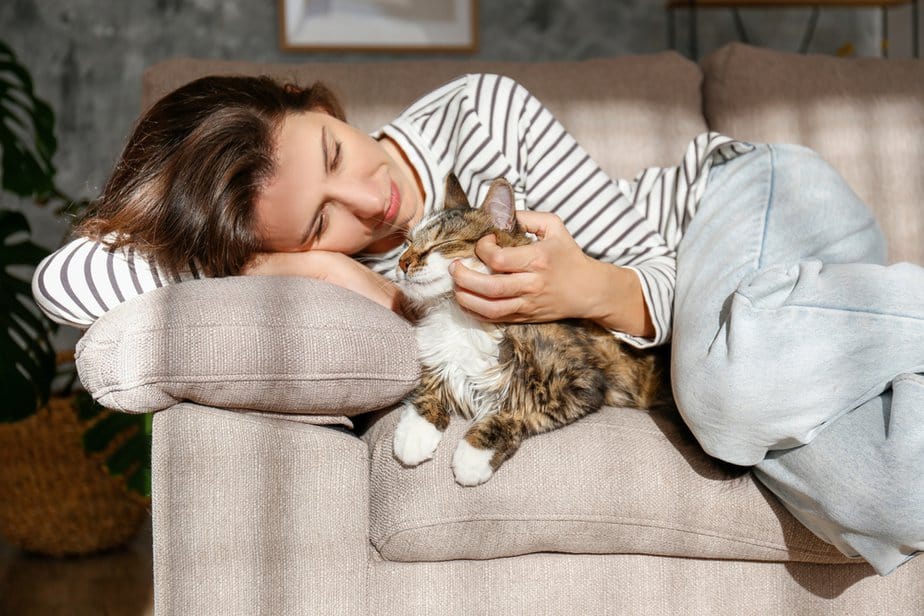
Can cats tell when you’re sick? This is the question that we’ve all been dying to find the answer to. After all, we want to know why Egypt was so obsessed with these furry creatures.
Dogs and cats can sense when you are unwell or dying, and they will either sit by your side to comfort you or flee from you out of fear of the changes.
Therapy cats are available in certain nursing homes and can tell whether a patient is on the verge of passing away or if something else is amiss. The nursing staff is aware of this and, if feasible, can treat the patient.
If someone falls sick, having a cat in the house that is familiar with the typical odors and routines might be helpful since they will notice it sooner than any person could.
Unbelievably, cats may both detect illness and contribute to human health improvement. They won’t be able to cure cancer or prolong the life of a dying person, but they can speed up recovery from lesser ailments.
All of this is accomplished by the force of their purrs. Their vocal box is vibrating, which is what humans perceive as a purring sound.
Additionally, the vibrational frequency of purrs is identical to that of vibrational treatment for humans. If your cat is purring when you are sitting next to them, you will feel the vibrations in your body. There are several advantages to these vibrations.
